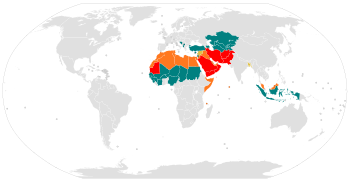Islamic state: Difference between revisions
Appearance
Content deleted Content added
m Formatting |
No edit summary |
||
| Line 8: | Line 8: | ||
]] |
]] |
||
An '''Islamic state''' has adopted [[Islam]], specifically [[Sharia]], as the ideological foundation for its political institutions (see [[Political aspects of Islam]]). Examples include: |
|||
* A [[Caliphate]] in Sunni Islam |
* A [[Caliphate]] in Sunni Islam; |
||
* An [[Imamah]] in Shia Islam |
* An [[Imamah]] in Shia Islam; |
||
** A [[Wilayat al-Faqih]] for the Shia in the absence of an Imamah |
** A [[Wilayat al-Faqih]] for the Shia in the absence of an Imamah; |
||
* An [[Islamic republic]] |
* An [[Islamic republic]] - a general term for many nation states who officially have a republican system and adopt Islam as the state religion. |
||
==See also== |
==See also== |
||
Revision as of 21:53, 21 October 2009
| Part of a series on Islamism |
|---|
|
|

Islamic states
Islam is state religion
secular states
No particular declaration
An Islamic state has adopted Islam, specifically Sharia, as the ideological foundation for its political institutions (see Political aspects of Islam). Examples include:
- A Caliphate in Sunni Islam;
- An Imamah in Shia Islam;
- A Wilayat al-Faqih for the Shia in the absence of an Imamah;
- An Islamic republic - a general term for many nation states who officially have a republican system and adopt Islam as the state religion.
See also
